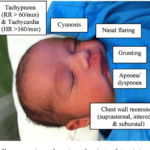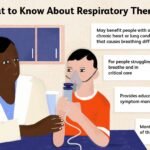
Have you ever wondered about the crucial role respiratory therapists play in managing cystic fibrosis in children? With their expertise and compassionate care, these healthcare professionals are indispensable in providing necessary respiratory treatments, monitoring lung function, and offering support and education to both the child and their family. In this article, we will explore the vital responsibilities of respiratory therapists in helping children with cystic fibrosis lead healthier lives, ensuring optimal lung function and improved overall well-being.
Diagnosis and assessment
Identification of symptoms
As a respiratory therapist, one of your key roles in managing cystic fibrosis in children is to identify and assess the symptoms associated with the condition. Cystic fibrosis is a complex genetic disorder that primarily affects the respiratory and digestive systems. Symptoms can vary from child to child, but commonly include persistent coughing, wheezing, shortness of breath, and recurrent lung infections. You will work closely with the child and their family to gather information about their symptoms and medical history to ensure accurate diagnosis and appropriate treatment.
Performing pulmonary function tests
To further understand the severity of the child’s respiratory impairment, you will conduct pulmonary function tests. These tests involve measuring lung capacity, airflow, and oxygen levels. They help determine the extent to which cystic fibrosis is affecting the child’s ability to breathe and provide valuable data for treatment planning. Pulmonary function tests may include spirometry, which measures how much air the child can exhale forcibly and quickly, as well as other specialized tests like lung volume measurements or gas diffusion tests. By performing these tests, you can assess the lung function of the child and monitor any changes over time.
Monitoring oxygen levels
In cystic fibrosis, maintaining adequate oxygen levels is crucial for the proper functioning of the body. As a respiratory therapist, you will regularly monitor the child’s oxygen levels using pulse oximetry, a non-invasive monitoring tool that measures the oxygen saturation in the blood. This helps ensure that the child is receiving enough oxygen and allows for prompt intervention if levels drop below the normal range. Monitoring oxygen levels is especially important during activities such as exercise or sleep when oxygen requirements may increase. By closely monitoring oxygen levels, you can identify any potential issues and adjust the treatment plan accordingly.
Interpreting test results
Your expertise in interpreting test results plays a vital role in understanding the progression and impact of cystic fibrosis on the child’s respiratory health. By analyzing the data obtained from pulmonary function tests, oxygen level monitoring, and other diagnostic tests, you can provide valuable insights to the medical team. Your interpretation of these results helps guide the development and adjustment of treatment plans, ensuring that the child’s respiratory needs are addressed effectively. Communicating these findings to the child’s healthcare team is vital for comprehensive care and allows for collaborative decision-making.
Developing and implementing treatment plans
Collaborating with medical team
A collaborative approach is essential in managing cystic fibrosis in children. As a respiratory therapist, you will work closely with physicians, nurses, and other healthcare professionals to develop and implement comprehensive treatment plans. Your expertise in respiratory care will contribute to the overall management of the child’s condition. By collaborating with the medical team, you can ensure that all aspects of the child’s care are addressed, including medication management, airway clearance techniques, and support for the child’s overall well-being.
Creating an individualized care plan
Every child with cystic fibrosis is unique, and their treatment should be tailored to their specific needs. With your knowledge and expertise, you will play a crucial role in creating individualized care plans for each child. These plans will consider various factors such as their age, symptoms, and response to treatment. Additionally, you will consider the child’s lifestyle and preferences, taking into account their ability to adhere to the recommended therapies. By developing individualized care plans, you can optimize the child’s treatment outcomes and quality of life.
Educating and involving the child and their family
Education is a cornerstone of managing cystic fibrosis in children, and you will serve as a valuable resource in providing information to both the child and their family. You will explain the nature of cystic fibrosis, the rationale behind various treatment modalities, and the importance of adherence to therapy. By involving the child and their family in the decision-making process, you empower them to take an active role in managing their condition. You will teach them about airway clearance techniques, proper medication administration, and techniques for self-management. Through education, you ensure that the child and their family are equipped with the knowledge to manage cystic fibrosis effectively.
Monitoring treatment effectiveness
Once the treatment plan is initiated, your role as a respiratory therapist involves closely monitoring the child’s response to therapy. This includes assessing their respiratory symptoms and lung function regularly, as well as tracking any changes in their overall health. By monitoring treatment effectiveness, you can identify any gaps or areas for improvement in the child’s care. Regular communication with the child and their family, as well as ongoing collaboration with the medical team, enables adjustments to be made promptly to ensure optimal treatment outcomes.

Administering respiratory therapies
Performing airway clearance techniques
Airway clearance techniques are a critical component of managing cystic fibrosis, as they help clear mucus build-up in the airways. As a respiratory therapist, you will teach the child and their family various airway clearance techniques, such as chest physiotherapy, positive expiratory pressure devices, or high-frequency chest wall oscillation. These techniques help loosen and remove mucus from the lungs, improving breathing and reducing the risk of lung infections. By ensuring that the child and their family are proficient in performing these techniques, you empower them to take an active role in their respiratory care.
Delivering inhaled medications
Many children with cystic fibrosis require daily inhaled medications to manage their symptoms effectively. As a respiratory therapist, you will be responsible for ensuring proper delivery of these medications. This may involve instructing the child and their family on the correct use of inhalers, nebulizers, spacers, or other inhalation devices. You will educate them on the purpose and benefits of these medications and help them develop a routine for consistent administration. By ensuring optimal delivery of inhaled medications, you can help control symptoms and improve lung function in children with cystic fibrosis.
Managing oxygen therapy
In some cases, children with cystic fibrosis may require supplementary oxygen to maintain adequate oxygen levels. As a respiratory therapist, you will be responsible for managing and monitoring oxygen therapy. This includes assessing the child’s oxygen needs, selecting appropriate oxygen delivery systems, and educating the child and their family on its proper use. You will monitor oxygen saturation levels regularly, adjust oxygen flow rates as necessary, and ensure the child’s comfort and safety. Your expertise in managing oxygen therapy plays a crucial role in maintaining optimal respiratory function in children with cystic fibrosis.
Assisting with mechanical ventilation
In severe cases of cystic fibrosis where respiratory function significantly deteriorates, mechanical ventilation may be required. As a respiratory therapist, you will support the medical team in the management of children who need mechanical ventilatory support. You will assist in the selection, monitoring, and maintenance of ventilators to ensure the child’s respiratory needs are met. Additionally, you will educate the child and their family on the ventilator settings and provide continuous care to ensure the child’s safety and comfort. By actively participating in the management of mechanical ventilation, you contribute to stabilizing and improving the child’s respiratory function.
Providing education and support
Educating the child and family about cystic fibrosis
Education is a crucial aspect of managing cystic fibrosis in children, and one of your main responsibilities as a respiratory therapist is to provide comprehensive education to the child and their family. You will explain the nature of cystic fibrosis, its underlying mechanisms, and its impact on the respiratory system. By providing this knowledge, you enable the child and their family to better understand the condition and the rationale behind various treatment modalities.
Teaching self-management techniques
Empowering the child and their family to take an active role in managing cystic fibrosis is essential for long-term success. As a respiratory therapist, you will teach the child self-management techniques, which include proper airway clearance techniques, recognizing early signs of respiratory distress, and adhering to medication schedules. By instilling self-management skills, you help foster independence and promote a sense of control in the child. Additionally, you will educate the family on how they can support the child in their self-management efforts.
Providing emotional support
Cystic fibrosis not only affects the physical well-being of children but also has an emotional impact on them and their families. As a friendly and empathetic respiratory therapist, you will provide emotional support to both the child and their family. You will listen attentively to their concerns, address their questions, and offer reassurance and encouragement. By fostering a supportive and understanding environment, you can help alleviate anxiety and fears associated with the condition.
Connecting families with resources and support groups
Caring for a child with cystic fibrosis can be challenging, and families may benefit from additional resources and support. As a respiratory therapist, you play a vital role in connecting families with community resources and support groups. These resources can provide valuable information, emotional support, and guidance on managing the daily challenges of living with cystic fibrosis. By linking families to these supportive networks, you empower them to navigate their journey more effectively and enhance their overall well-being.

Monitoring and evaluating progress
Regularly assessing lung function
Monitoring the child’s lung function on a regular basis is crucial in assessing the progression of cystic fibrosis and the effectiveness of the treatment plan. As a respiratory therapist, you will use pulmonary function tests, such as spirometry, to assess the child’s lung capacity, airflow, and other relevant parameters. By tracking lung function regularly, you can identify any decline or improvement and adjust the treatment plan accordingly. Your expertise in interpreting the test results allows for accurate assessment, ensuring that the child receives the most appropriate care.
Tracking symptoms and their severity
In addition to monitoring lung function, it is important to track the child’s symptoms and their severity. As a respiratory therapist, you will regularly assess the child’s respiratory symptoms, including cough, wheezing, shortness of breath, and the frequency and severity of lung infections. By closely tracking these symptoms, you can identify any worsening or improvement and modify the treatment plan as needed. By working closely with the child and their family, you can ensure that the child’s symptoms are effectively managed.
Adjusting treatment plans as necessary
Cystic fibrosis is a dynamic condition that requires ongoing evaluation and adjustment of treatment plans. By closely monitoring the child’s progress, as well as their response to therapy, you play a pivotal role in adjusting the treatment plan as necessary. This may involve modifying medication doses, altering airway clearance techniques, or introducing new therapies. Your expertise and ongoing collaboration with the medical team ensure that treatment plans are tailored to the child’s specific needs at each stage of their journey with cystic fibrosis.
Collaborating with other healthcare providers for comprehensive care
Providing comprehensive care for children with cystic fibrosis requires interdisciplinary collaboration. As a respiratory therapist, you will collaborate closely with physicians, nurses, dietitians, and other healthcare providers to ensure that all aspects of the child’s care are addressed. By communicating and sharing information, you contribute to a coordinated approach that optimizes the child’s treatment outcomes. Collaboration may involve participating in healthcare team meetings, sharing treatment plans, and working together to overcome any challenges that may arise. Through this collaboration, you provide holistic care that enhances the child’s overall well-being.
Emergency response and crisis management
Identifying and responding to respiratory emergencies
Respiratory emergencies can occur in children with cystic fibrosis, and as a respiratory therapist, you must be prepared to identify and respond promptly. You will monitor the child’s respiratory status closely and be vigilant for any signs of distress, such as severe shortness of breath, increased wheezing, or a sudden drop in oxygen levels. If a respiratory emergency occurs, you will initiate appropriate interventions, which may include administering oxygen, providing airway support, or initiating emergency medications. Your ability to recognize and respond to emergencies is crucial in ensuring the child’s safety and well-being.
Administering emergency medications
In critical situations, emergency medications may be necessary to stabilize and support the child’s respiratory function. As a respiratory therapist, you will be responsible for administering these medications and ensuring their proper delivery. This may involve the use of bronchodilators, corticosteroids, or other appropriate interventions. You will closely monitor the child’s response to these medications, adjusting dosages as necessary. By administering emergency medications, you contribute to the immediate management of respiratory crises in children with cystic fibrosis.
Providing airway support
In severe respiratory emergencies, the child may require immediate airway support to ensure their ability to breathe. As a respiratory therapist, you are skilled in providing airway support techniques such as bag-valve-mask ventilation, intubation, or other advanced airway management strategies. Your expertise and quick response can make a significant difference in stabilizing the child’s respiratory status and preventing further complications.
Collaborating with emergency medical teams
In complex and critical situations, collaboration with emergency medical teams is often necessary. As a respiratory therapist, you will work closely with these teams, providing valuable information and insights into the child’s respiratory condition. Your expertise in managing cystic fibrosis and familiarity with the child’s treatment plan allows you to contribute to the overall management of the emergency situation. By collaborating effectively with emergency medical teams, you ensure that the child receives timely and appropriate care.

Coordinating care and interdisciplinary communication
Working closely with physicians and nurses
Collaboration with physicians and nurses is essential in managing cystic fibrosis in children. As a respiratory therapist, you will work closely with these healthcare professionals to coordinate care and ensure that treatment plans are implemented effectively. You will communicate regularly with physicians and nurses, providing updates on the child’s progress, discussing treatment plan adjustments, and seeking guidance when needed. By fostering open communication and mutual respect, you contribute to a cohesive healthcare team focused on the best interest of the child.
Keeping accurate and detailed patient records
Accurate and detailed patient records are essential in managing cystic fibrosis in children. As a respiratory therapist, you will maintain thorough documentation of the child’s assessments, test results, treatment plans, and any modifications made over time. These records serve as a comprehensive reference for the healthcare team and allow for continuity of care. By ensuring the accuracy and completeness of patient records, you contribute to a well-coordinated and seamless care experience.
Communicating treatment plans to other healthcare providers
Effective communication is crucial when managing the care of children with cystic fibrosis. As a respiratory therapist, you will play a key role in communicating the child’s treatment plans to other healthcare providers involved in their care. This may include sharing information with primary care physicians, specialists, and allied healthcare professionals. By effectively communicating the treatment plan, you ensure that all healthcare providers have a comprehensive understanding of the child’s needs, contributing to coordinated and optimal care delivery.
Participating in healthcare team meetings
Participation in healthcare team meetings is an important aspect of managing cystic fibrosis in children. As a respiratory therapist, your presence in these meetings provides valuable insights into the child’s respiratory status, treatment progress, and any challenges encountered. By actively participating in these multidisciplinary discussions, you contribute to a holistic approach to care and facilitate collaborative decision-making. Healthcare team meetings serve as platforms for sharing information, discussing treatment adjustments, and ensuring that all facets of the child’s care are addressed.
Staying up-to-date on current research and techniques
Attending medical conferences and workshops
Keeping abreast of the latest research and techniques is crucial in providing the best care for children with cystic fibrosis. As a respiratory therapist, you will attend medical conferences and workshops to stay informed about advancements in cystic fibrosis management. These events provide opportunities to learn from experts in the field, explore new treatment modalities, and exchange knowledge and experiences with other healthcare professionals. By staying up-to-date, you enhance your expertise and contribute to the continuous improvement of care for children with cystic fibrosis.
Continuing education and professional development
The field of respiratory therapy is constantly evolving, and maintaining your professional competence requires ongoing education and development. As a respiratory therapist, you will actively pursue continuing education opportunities that expand your knowledge and skills in managing cystic fibrosis. This may involve attending specialized training programs, participating in online courses, or engaging in professional development activities. Continuously enhancing your expertise allows you to provide the best possible care for children with cystic fibrosis and remain at the forefront of the field.
Keeping abreast of new treatment modalities
With advancements in medical research and technology, new treatment modalities for cystic fibrosis are constantly emerging. As a respiratory therapist, it is your responsibility to stay informed about these new modalities. By keeping abreast of the latest treatments, you can provide valuable insights to the medical team and contribute to informed decision-making. This knowledge enables you to optimize treatment plans and ensure that children with cystic fibrosis have access to the most innovative and effective therapies available.
Implementing evidence-based practices
Evidence-based practice forms the foundation of providing quality care for children with cystic fibrosis. As a respiratory therapist, you will play a vital role in implementing evidence-based practices in your daily work. This involves integrating current research, clinical guidelines, and best practices into the care provided to children with cystic fibrosis. By following evidence-based practices, you can ensure that the care delivered is based on the most up-to-date information and provides the best possible outcomes for the child.
Advocacy for patients and families
Supporting the rights of patients with cystic fibrosis
Advocacy is an integral part of the role of a respiratory therapist in managing cystic fibrosis in children. You will support the rights of children with cystic fibrosis, ensuring that they receive equitable treatment, access to care, and necessary support services. By advocating for the rights and needs of the child, you contribute to an inclusive and supportive healthcare environment.
Ensuring access to appropriate care
As a respiratory therapist, you will work to ensure that children with cystic fibrosis have access to appropriate and timely care. This may involve liaising with insurance providers, coordinating referrals to specialists, or advocating for necessary medical equipment and services. By actively addressing barriers to care and facilitating access, you contribute to the child’s overall well-being and treatment outcomes.
Advocating for insurance coverage
Cystic fibrosis management often requires extensive medical interventions and therapies. As a respiratory therapist, you will advocate for insurance coverage to ensure that children with cystic fibrosis have access to the necessary treatments and medications. By actively participating in the insurance process and working closely with the child’s healthcare team, you contribute to reducing financial burdens and ensuring equal access to care.
Promoting awareness and understanding of cystic fibrosis
Raising awareness and promoting understanding of cystic fibrosis is an essential aspect of advocacy. As a respiratory therapist, you will actively participate in initiatives to educate the community, schools, and other healthcare professionals about the condition. By promoting awareness, you contribute to creating a supportive and inclusive environment for children with cystic fibrosis, reducing stigma, and enhancing their overall quality of life.
Research and quality improvement
Participating in research studies
Respiratory therapists make valuable contributions to research studies focused on improving the care and outcomes of children with cystic fibrosis. Through participation in research studies, you can actively contribute to expanding the understanding of the condition and evaluating the effectiveness of new treatments and interventions. By engaging in research, you help advance the field of cystic fibrosis management and ultimately improve the lives of children living with this condition.
Contributing to quality improvement initiatives
Continuous quality improvement is a fundamental aspect of healthcare. As a respiratory therapist, you will actively contribute to quality improvement initiatives aimed at enhancing the care provided to children with cystic fibrosis. This may involve analyzing data, identifying areas for improvement, and implementing changes that optimize treatment outcomes. By actively participating in quality improvement initiatives, you contribute to the ongoing enhancement of care for children with cystic fibrosis.
Evaluating and implementing best practices
Evaluating and implementing best practices is essential to provide the highest standard of care for children with cystic fibrosis. As a respiratory therapist, you will stay informed about current clinical guidelines and evidence-based practices. By evaluating these practices and their applicability to your clinical setting, you can ensure that the care provided aligns with the most updated recommendations. Implementing best practices enhances the quality of care and contributes to improved outcomes for children with cystic fibrosis.
Enhancing the quality of care for children with cystic fibrosis
The ultimate goal of a respiratory therapist’s role in managing cystic fibrosis in children is to enhance the quality of care and improve the overall well-being of these young patients. Through a combination of ongoing education, collaboration with healthcare teams, advocacy, and research participation, you contribute to providing comprehensive and evidence-based care. By staying dedicated to the continuous improvement of care, you make a significant impact on the lives of children with cystic fibrosis and their families.









